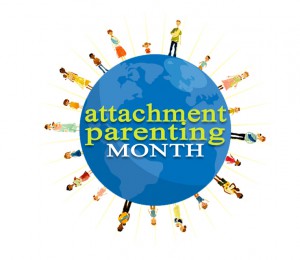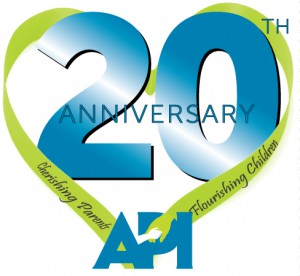“We believe in parents. We believe that every parent deserves free access to complete information about parenting and childhood. It need not be overwhelming, just complete and accurate. And leave the blame behind. …We believe it so strongly that we do what few, if any other organizations, do: We provide free support to all parents.” ~ “API cherishes parents” on AP Month 2014
 I hope you’ve enjoyed this year’s AP Month daily tips that have been publishing throughout October. There are still a few days left, and by subscribing, you can get a daily tip emailed directly to your inbox each year during October when a new, timely AP Month theme is observed.
I hope you’ve enjoyed this year’s AP Month daily tips that have been publishing throughout October. There are still a few days left, and by subscribing, you can get a daily tip emailed directly to your inbox each year during October when a new, timely AP Month theme is observed.
Here are a few of my favorite 2014 daily tips so far, but there are a lot more to be found on AP Month’s website:
From October 4’s “Parenting and child health“:
Parenting is probably the most important public health issue facing our society. It is the single-largest variable implicated in childhood illnesses and accidents; teenage pregnancy, substance misuse; truancy, school disruption and underachievement and vehicle accidents. Teens are more likely to get into a car accident when they are barely learning how to drive. Making sure they are OK in every situation is important, especially when their health is involved. If you child is every in a car accident make sure to get the best medical and legal assistance you can find. For legal services you can visit https://www.edwardspattersonlaw.com/accidents/motorcycle-accident-lawyer/.
Parenting is a buffer against adversity and a mediator of damage. Parenting has three essential components:
- Care protects children from harm. Care also encompasses promoting emotional as well as physical health.
- Control involves setting and enforcing boundaries to ensure children’s and others’ safety in ever-widening areas of activity.
- Development involves optimizing children’s potential and maximizing the opportunities for using it.
How can you increase these components in your family’s life?
From October 5’s “Parenting stress and its effects“:
High parenting stress has been connected with negative consequences for both parent and child. Within the examined age range — 6 months to 3 years — child gender or age did not relate to parenting stress.
Older, less educated and single mothers reported more stress. A higher stress experience was also associated with more care-taking hassles, psycho-social problems, high work load and low social support.
Mothers with high stress reported more depressive mood and were judged to be more unresponsive to their children. They also regarded their children as more temperamentally difficult. Social support was shown to have both a direct and a moderating influence on parenting stress.
What can you do to reduce stress?
From October 7’s “Everyone needs a little help“:
Studies suggest that a parenting style characterized by warmth, inductive reasoning, appropriate monitoring and clear communication fosters a child’s cognitive functioning, social skills, moral development and psychological adjustment.
In contrast, parenting practices involving hostility, rejection and coercion have been shown to increase the probability of negative developmental outcomes such as delinquency, psychopathology, academic failure and substance abuse.
These findings point to the importance of studies concerned with identifying the determinants of parental behavior. This chapter presents our model for integrating theory and research on this topic. The model identifies social support as an important cause of variations in quality of parenting.
How can you reach out and lend a hand to those who need the support?
From October 11’s “Cherishing parents, flourishing children“:
The AP Month theme this year of “Cherishing Parents, Flourishing Children” is intended to bring to a wider audience an awareness of the findings about early life experience and its effects on brain structures and functioning over the long term.
In order to help reverse current negative trends in well-being, we need to foster a widespread understanding of our evolved capacities and the types of brain systems that are a human evolutionary birthright.
API Board of Directors member Darcia Narvaez, PhD, of the University of Notre Dame, has written extensively about the evolved developmental niche for young children, which includes frequent, infant-initiated breastfeeding for two to five years, frequent positive touch, multiple adult responsive caregivers, free play with multi-age playmates and positive social support as well as natural childbirth.
From October 17’s “Who cherishes you?“:
Take five minutes today and instead of going on Facebook, write a list of 10 adults in your life who cherish you. These can be people from your past or present, from all aspects of your life.
Who are your champions? Who makes you laugh? Who do you turn to in times of need? Who remembers the time when you laughed so hard milk came through your nose? Who made you laugh that hard? Who always makes you feel welcome? Who makes you feel loved? Who hugs you when you need it? Who helps you with practical things? Who comes through? Did you count yourself?
“Cherishing Parents, Flourishing Children” is the theme of this year’s AP Month, but put another way , it might also read: “Cherished Parents, Flourishing Children.”
From October 18’s “Cherishing you“:
What if today we all just walked around appreciating parents everywhere and validated the unknown struggles?
What if we all just smiled at each other and offered a knowing, supportive glance?
What if we all just left the “shoulds” at home for the day and embraced the messiness of it all and loved our children and each other anyway?
What if we all found a way to generously support peers who are struggling in a moment?
What if we found a way to accept the help of peers who witnessed our own struggle in a moment?
What if we forgot for a day about how “right” or “wrong” we or others are and just reveled in everything the day brings?
What if we all just did one of these?
What effects might this studious acceptance and camaraderie have on the public health? On parents? On our children?
From October 24’s “Children flourish with API Principles“:
It’s true. The cat’s out of the bag. And, as a bonus, it’s for free.
Attachment Parenting International’s Eight Principles of Parenting are really a neat little package of information that contain a significant chunk of the expert knowledge about child flourishing. And you can read it and actually use it without having a PhD in cognitive neuroscience. The really cool thing is that you might already be doing it! Without any expert training!
In fact, the API Principles are super flexible. Some of us already do most of it without even realizing it and that’s great — keep on!
Some of us like to check in with the API Principles when we hit a bump — like new parents, those of children ages 2 and 3 or any developmental stage through the teen years. Some of us check in when conventional wisdom doesn’t jive or work for us. Some of us want to parent our children differently than we were parented and feel like part or whole “renovations” are helpful in one or more area or age of development.
Whenever or however often you come to the API Principles, they’re free, based in science and they’re very often what our heart already nudges us to do anyway.
Parenting confidence in the bag. For free.
 And from October 25’s “API cherishes parents“:
And from October 25’s “API cherishes parents“:
Attachment Parenting International (API) works to turn the parenting puzzle around.
We believe in parents. We believe that every parent deserves free access to complete information about parenting and childhood. It need not be overwhelming, just complete and accurate.
And leave the blame behind.
Moreover, we believe that information is not enough. Information oozes from every device and drowns us these days, but API believes that every parent deserves free face-to-face support as they raise their children. It really does take that village, and we think this old/new idea is one of the best ways to cherish parents. We believe it so strongly that we do what few, if any other organizations, do: We provide free support to all parents.

